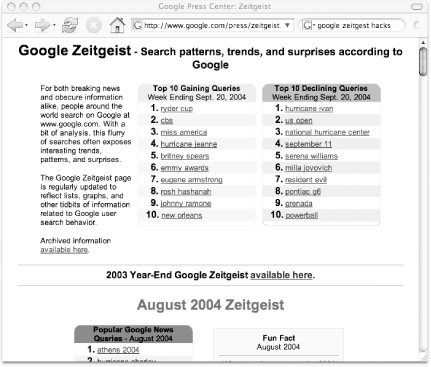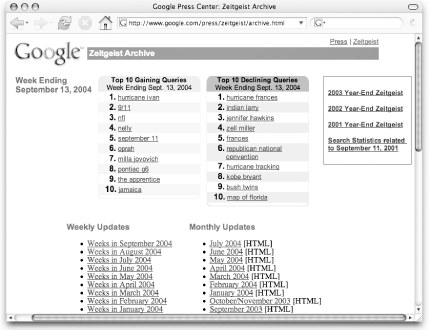|
|
< Day Day Up > |
|
Hack 2. Glean a Snapshot of Google in Time
Google Zeitgeist provides a weekly, monthly, and yearly overview of what the Web was interested in. Turning to Google itself for a definition of zeitgeist, (define:zeitgeist), there's consensus that it refers to "the spirit of the times." And Google Zeitgeist (http://www.google.com/press/zeitgeist.html) is just that: a mirror that the Web (according to Google) holds up to us, providing a snapshot of the week, month, or year that was. A typical weekly Google Zeitgeist (Figure 1-8) lists the top 10 gaining and declining queries and some hand-picked statistics (e.g., top Google News queries, popular sequels), fun facts (e.g., Tour de France versus Wimbledon), aggregate information gleaned about Googlers (e.g., operating systems, web browsers, languages), and any other trends that the Zeitgeist crew cares to delve into. Figure 1-8. The week's top 10 gaining and declining queries It takes only a few moments of visiting Google Zeitgeist before you're itching to go back a little further in time: the week your second child was born, the month of the Olympics, the year you graduated from high school. Click the "Archived information available here" link to browse the Google Zeitgeist Archive (Figure 1-9) of updates for every week, month, and year since January 2001.
Figure 1-9. The Zeitgeist Archive holds weekly, monthly, and yearly updates from January 2001 to today The monthlies and year-ends provide more detail with trend graphs and also further break down searching by country, from Korea to Canada and points in between. While Google Zeitgeist's statistics aren't earth shattering (e.g., "Searches for `iraq' more than doubled on March 19, the date that Operation Iraqi Freedom began"—imagine that!), it does provide you a snapshot of what the world in aggregate (55 billion searches in 2003) found interesting enough to look up. 1.14.1. See Also
|
|
|
< Day Day Up > |
|